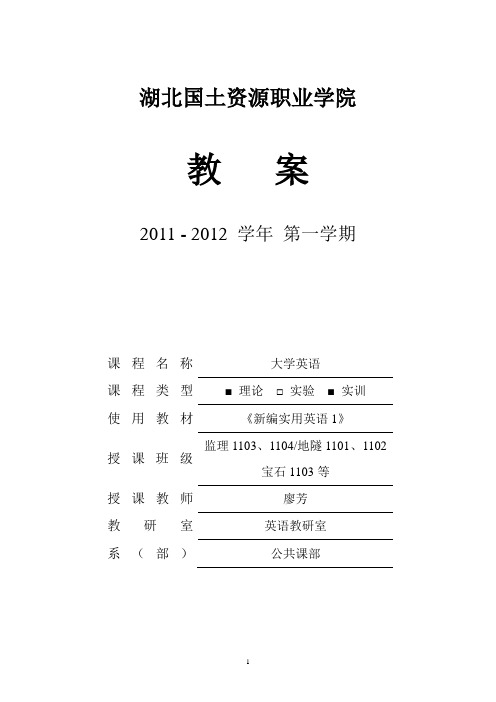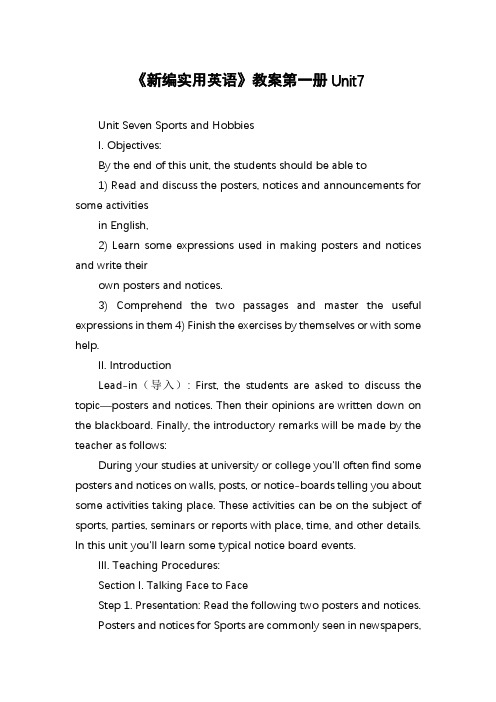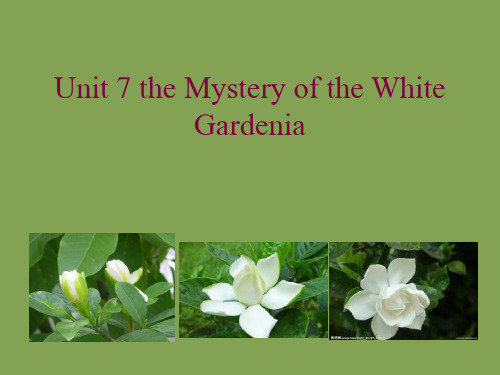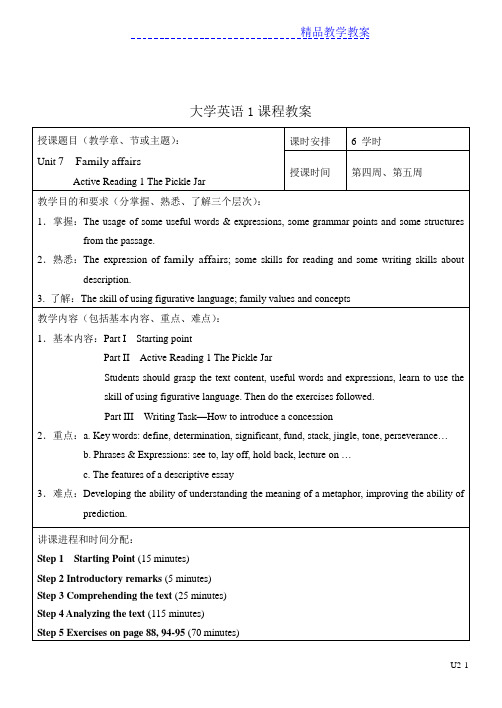实用英语综合教程1第七单元全英教案
新编实用英语1七单元教案

other loved ones who are far away. Their leafy fall designs and touching sentiments are a beautiful way to frame your photos and send your most heartfelt thanks. Is a big family get-together with a roasted turkey and all the trimmings the main event of your Thanksgiving holiday? Focus on your traditional Thanksgiving Day dinner with delightful Thanksgiving cards that feature all your favorite foods. Or, send a sweet surprise straight to their mailbox with an individual Thanksgiving greeting card that is guaranteed to please. Whether you love Thanksgiving because it’s a chance to cook up a feast, get your gobble on or just kick back and watch the big game, sending cards to those you love is a wonderful way to show you care. Show everyone your attitude of gratitude this turkey day with Thanksgiving cards from Tiny Prints. At Tiny Prints, we know that personalized birth announcements, birthday party invitations, baby shower invitations, thank you cards and Christmas cards offer thoughtful ways to share your special celebrations with family and friends throughout the year. That's why we're proud to offer you a wide selection of exclusive designs delivered with the best customer service you can find online or in stores no matter what occasion you're celebrating. From fun photo cards, religious invitations, address labels and more, we've got everything you need to add a stylish touch to all of your festivities. We'll even help review, proofread and perfect every inch of your birth announcement and photo card designs to ensure that you always send your best in a fashionable and flawless way. It's the least we can do to help you showcase your style in an exceptional way! We've also expanded our line of business cards to include fun new flat, folded and square designs that you can personalize with your own text, photos, design accents and colors. It's the perfect way to make sure you stick to your resolution to stand out from the rest of the stack when you meet new clients, colleagues and contacts. Whether you are looking for modern business cards,custom business cards or logo business cards, Tiny Prints has many different personal business cards for you. And if you're just looking for individual greeting cards, we've got plenty of those too. From birthday cards to Anniversary Cards and beyond, browsing through our greeting card options alone is sure to brighten your day. Plus, we never forget that personalized birthday party invitations, baby shower invitations and thank you cards are festive and thoughtful ways to share your special celebrations with family and friends throughout the year. That's why we're proud to offer you a wide selection of exclusive designs delivered with the best customer service you can find online or in stores no matter what occasion you're celebrating!
新编实用英语综合教程1__Unit_7 ppt课件

the job. ______________________. See you. B: See you. 5. A: I’m really sorry, but I have to go now. My flight ________________. B: _______________. Bye-bye.
1. What are they talking about?
A. Film.
B. Job.
C. Ticket.
D. Time.
2. How many hours should Emma work?
A. 2.
B. 3.
C. 4.
D. 5.
3. When can Emma be free?
A. Monday.
• 3. flight
/flait/
• n. 飞行,航班 n. 奇思妙想,一段楼梯
n. 逃跑
v. (鸟)惊飞
新编实用英语综合教程1__Unit_7
• 4. monthly /'mʌnθli/
• adj. 每月的,持续一个月的,每月发生的 adv. 每月,按月 n. 月刊
• 5. decision
/di‘siʒən/ n. 决定,决策
B. Friday.
C. Sunday.
D. Weekend.
4. How much monthly pay does Emma hope?
A. More than 800 yuan.
B. Less than 800 yuan.
实用英语综合教程第1册教案

实用英语综合教程第1册教案An Integrated Skills Course 1ContentsUnit1 Education (2)Unit2 Friendship (8)Unit3 Gifts (12)Unit4 Movies (18)Unit5 Our Earth (22)Unit6 Part-time Jobs (30)Unit 7 Health (36)Unit 8 Famous People (48)Unit 9 Festival (61)Unit 10 Animal Stories (73)Unit1 EducationObjectives1.Read what Bill Gates says about education;2.Build up your vocabulary relating to campus life;3.Learn something from an ancient Greek educator;4.Study different types of nouns;5.Write an introduction of yourself.Focuses1.Build up your vocabulary relating to campus life;2.Write an introduction of yourself.Outline1.Warm-up Discussion; study of words and expressions in Text A; Vocabulary Check (B and C)2.Discussion of Text A and the follow-up exercises (A and B)3.Active Words and V ocabulary Check; Grammar Tips4.Discussion of Text B and the follow-up exercises/doc/5040d052e87101f69e31955e.html prehensive Exercises (Ask the students to do the translation exercises outside of theclass beforehand)6.Practical WritingProcedures:Classroom ActivitiesI. Warm-up discussionQuestion: Do you know anything about Bill Gates such as his life and his educational background?Hint1)birthday and birthplace: October 28, 1995; Seattle, Washington2)educational background: Harvard University (education not completed)3)career: chairmen and chief software architect of Microsoft, the word‘s largest and most profitable software company.4)main events in his life:a.beginning programming computers at age 13;b.developing a version of the programming language BASIC for the first microcomputer in Harvard;c.founding Microsoft Corporation in 1975 at the age of 19II. Vocabulary in Text A1. education n.教育e.g. Children in poor areas receive free education.educate v.教育;教导educated adj.受教育的e.g. a well-educated maneducator n.教育家,教育者2. count v.派用场,点数e.g. 1) Every seconds counts.2) What counts more is whether you have tried your best.3) to count from 1 to 1004) Count these apples.3. advantage n.有利条件,好处;优点,优势e.g. This product has many advantages.advantageous adj.有利的,有益的,便利的e.g. It is highly advantageous to us.Phrase: take advantage of 很好的使用;利用e.g. take advantage of all educational opportunitiesAntonym: disadvantage n.不利;不利条件e.g. His bad health is a great disadvantage to him when he looks for work.4. lifetime n.一生,终生e.g. 1) a lifetime guarantee2)lifetime membership3) In my father‘s lifetime there have been many changes in the village.5. part-time adj.& adv.兼职的(地)e.g. 1)a part-time job2)He works part-time.full-time adj.全职的e.g. a full-time housewife6. programmer n.程序师,编程员program v.编制程序e.g. Please program the computer to do the job instead of doing it manually(手工操作).7. discourage vt. 不鼓励;使泄气,使失去信心e.g. His parents discouraged him from joining the air force.discouraged adj. 泄气的,失去信心的discouraging adj.使人泄气的,使人失去信心的e.g. 1) If you meet difficulty in your study, don‘t be discouraged.2) It is discouraging that I didn‘t k now how to solve the problem.Antonym: encourage vt.鼓励e.g. I encouraged her to work hard and to try to pass the examinations.courage n. 勇敢,勇气e.g. David showed great courage when he saved the child from the burning house.8. diploma n. 文凭,毕业证书e.g. a college diplomadiplomatic adj. 外交的,从事外交的e.g. Julia joined the diplomatic service after her graduation from university.9. project n.项目,课题e.g. 1) an impossible project2) The professor is directing a research project.Synonym: plan10. highly adv. 高度地;非常e.g. 1) a highly interesting story2) a highly paid jobPhrase: speak/ think highly of 赞扬,对…给予很高评价e.g. The leader speaks / thinks highly of our work.11. focus v.(使)集中;(使)聚焦e.g. 1) to focus (one‘s mind) in work2) All eyes focused on the speaker.focus n.(兴趣活动等的)中心,焦点e.g. Because of his strange clothes, he immediately becamethe focus of attention when heentered the office.12. range n. 范围e.g. You have a wide range of choices.range vi.在某范围内变化e.g. The temperature ranges from 10 to 20 degrees.13. attend v.参加,出席e.g. attend schoolattend a lectureattendance n.出席,到场14. automatically adv.自动地e.g. the machine operates automatically.automatic adj.自动的e.g. We have an automatic washing machine.15. drop out of 退学,不参与,退出e.g. 1) He dropped out of school at the age of 10 because his family was too poor to afford thetuition.2) She decided to drop out of the competition because it was not fire.16. chance of a lifetime 千载难逢的良机,一生中唯一的机会e.g. It‘s the chance of a lifetime. You will regret it the rest of your lif e if you don‘t take it.17. try out 试验,考验e.g. She bought a cookbook and tried out a few new recipes.18. in short 简而言之,总之e.g. In short, you should study hard for a better future.Synonym: in brief/ to sum up/ all in all/ in conclusionIII. Language Points in Text A1.They want to know what to study, or whether it?s Ok todrop out of college since that?s what I did.what to study: This is a wh-word + infinitive structure used as the object, which can be changed into an object clause. Wh-word + infinitive structure can be used as a subject, an object, or an appositive clause(同位语从句),for example:1)How to improve their English is often discussed among the students.2)We haven‘t decided when to visit the place.3)You haven‘t answered my question about wher e to get these books.it?s Ok to drop out of college: Here ―it‖ is used as a formal subject, and the actual subject is the infinitive structure ―to drop out of college‖. The general pattern is ―It is + adj. + (for/ of + sb.) todo sth.‖ More examples:1)It was very thoughtful of her to come to see me when I was ill.2)It‘s easy for me to see through his trick.that?s what I did: ―what I did‖ here is a predictive clause (表语从句)introduced by ―what‖. It is always structured in the form of ―subject + be/ look/ remain/ seem + predictive clause‖ and can be introduced by such words as ―that‖ (always omitted), and other wh-words, for example:1) It seems (that) it is going to rain.2) This is why I refused to attend the meeting.2. As I?ve said before, nobody should drop out of college unless they believe they face the chance of a lifetime.As I?ve said before: This is a non-restrictive relative clause(非限制性关系从句) introduced by ―as‖(正如…的那样), which can be placed at the beginning or at the end of the sentence. Moreexamples:1) As people expected, she was admitted to Beijing University.2) Hundreds of people were killed in the earthquake, as I have learned from the newspaper. unless: is a conjunction for an adverbial clause of condition (条件状语从句), which equals ―if…not…‖(除非).e.g. I won‘t leave unless the rain stops.3. In my company?s early years, we have a bright part-time programmer who planned to drop out of high school to work.planned to: intend to do sth.计划、打算做某事e.g. I plan to make a trip to Beijing during the summer vocation.who planned to …work: a restrictive relative clause introduced by ―who‖ since its antecedent is a person and serves as the subject in the clause. The relative pronoun ―that‖ can be used here too. More examples:1) The young man who sits there quietly is my brother.2) I don‘t like people that pry into others‘ private business.4. Having a diploma certainly helps somebody who is looking to us for a job.look to sb./ sth.: to depend on sb. or sth. for help or advice 指望,依赖e.g. We look to you for support.5. High school and college offer you the best chance to learn many things and to do projects with others that teach you about team spirit.that teach you about team spirit: This is a restrictive relative clause introduced by ―that‖, whose antecede nt acts as the subject of the clause. Actually the relative clause introduced by ―that‖ can be used to modify both the person or the thing,and the roll of ―that‖ can be either the subject or the object.e.g. He was the only one that I knew there.I haven‘t been to the place that you have mentioned.6. In high school there was a time when I was highly focused on writing software, but for most of my high school years I had many interests.when …software: This is a relative clause introduced by the relative a dverb ―when‖, which acts as the adverbial of time in the clause.e.g. 1) There was a time when I completely lost my self-confidence.2) I will never forget those days when we were together.7. For me, classroom is not the only place where you can learn.where you can learn: This is a restrictive relative clause introduced by the relative adverb ―where‖, which is used as the adverbial of place in the clause.e.g. 1) Do you still remember the restaurant where we had dinner last night?2) This is the place where he stayed his whole life.8. In short, it?s a real mistake not to take the chance to studya wide range of subjects and to learn to work with other people because education does count.it?s a real mistake not to take the chance: This is an example of a negative infinitive structure, where ―not‖ is placed before an infinitive.e.g. 1) We are asked not to speak loudly in class.2) It is a good idea not to go out on such a rainy day.IV. Focus on Grammar名词(Noun )一、名词的概念表示人、事物或抽象概念的词叫做名词。
《新编实用英语》教案第一册Unit7

《新编实用英语》教案第一册Unit7Unit Seven Sports and HobbiesI. Objectives:By the end of this unit, the students should be able to1) Read and discuss the posters, notices and announcements for some activitiesin English,2) Learn some expressions used in making posters and notices and write theirown posters and notices.3) Comprehend the two passages and master the useful expressions in them 4) Finish the exercises by themselves or with some help.II. IntroductionLead-in(导入): First, the students are asked to discuss the topic―posters and notices. Then their opinions are written down on the blackboard. Finally, the introductory remarks will be made by the teacher as follows:During your studies at university or college you'll often find some posters and notices on walls, posts, or notice-boards telling you about some activities taking place. These activities can be on the subject of sports, parties, seminars or reports with place, time, and other details. In this unit you'll learn some typical notice board events.III. Teaching Procedures:Section I. Talking Face to FaceStep 1. Presentation: Read the following two posters and notices.Posters and notices for Sports are commonly seen in newspapers,on campus and on notice-boards (通知栏).Sample 1*****ALL MATCHTeams: Binhai University vs. Normal UniversityTime: 8: 30 a.m., Nov. 24, 2001 (Saturday)Place: Provincial Gymnasium (省体育馆)Sponsor (赞助人): The Physical Culture Academy (学会)Please contact the Physical Culture Academy for tickets (limited to 100). Basketball fans should hurry. Three school buses will take fans to the match. Fans are expected togather in front of the library at 8:00 sharp the day of the game.篮球赛参赛队:滨海大学:师范大学时间:2021年11月24日(周六)上午8:30 地点:省体育馆赞助人/主办单位:体育学会请与体育学会联系定票事宜(限定人数为100人),欢迎篮球迷们踊跃观战。
英语1 unit7 教案

A: Hello!
B: Hello! This is …. Can/May I speak to ….?
A: This is … speaking. ….isn’t in at the moment. Can /May I take a message?
B: Ok, thanks.
A: All right, I’ll tell him / her.
3.学生能根据常用打电话句型,开展相关打电话讲述正在干什么事的对话
教学重点
( 1 )通过学习打电话的对话,让学生掌握常用打电话语句。
( 2 )在打电话对话教学中渗透现在进行时的学习
教学难点
( 1 )学生记住关于运动项目的单词
( 2 )学生听懂有关打电话对话中的详细内容学生听懂有关进行体育活动的打电话内容
To: Tom
Things: come to school to watch the basketball match this evening
To: Jane
Things: come to the playground to play volleyball together this afternoon
B: Thank you. Bye!
2. Performance: Make a call
Teacher explains the rule: Make a phone call to your friend to invite him or her to take part in a sport item. But he/she is not in when you call. And his/her father answers the phone. The cards with sentences and words on the blackboard will help you to finish the dialogue.
新编实用英语1七单元教案设计

The super star Spicy Girls will lead the performance.
How to write notice?
Christmas Cards, Business Cards, Party Invitations at Tiny Prints It's a magical moment at Tiny Prints—our collection of 2011 Christmas cards have appeared! Be enchanted by our newest designs, brightest colors and most alluring array of formats ever. Kiss ordinary cards goodbye and fall in love with our incredible selection of Christmas cards. When you find the holiday card of your dreams, put your favorite family photo on the front (or back, or even inside with our latest layouts!). Sending photo Christmas cards is a wonderful way to share the spirit of the season with special friends and family. Your Christmas greeting orders are given the royal treatment by professional designers, ensuring that your Christmas cards will earn a place of honor in the hearts and homes of every loved one on your list. Bright leaves and crisp breezes are blowing around—it's Thanksgiving time! This season of gratitude is the perfect time to send out Thanksgiving cards to special family and friends. Send Happy Thanksgiving wishes with stylish cards that are sure to bring smiles. Photo Thanksgiving cards from Tiny Prints are a thoughtful way to keep in touch with parents, grandparents and
综合英语教程1 unit7 the mistery of the white gardenia

Answers
• • • • • • 3. What are they for 1.d 2. f 3.e 4.b 5.a 6.c 4. More sentences a.5 b.1 c.8 d.14 e.10 f.9 g.9 h.12 i.13 j.7 k.4 l.4 m.6 n.2
Proverb
Housing? Transportation? Employment? Environment? People relationships?
• Useful structures and expressions:
With the rapid development in our social and economic reforms, …. Some changes are overwhelming. the 2008 Summer Olympic Games the 2010 World Expo In the golden rays of sunshine
Part 1 Communicative Activities
Aims
• Language skills for making comparison and contrast in personal qualities and modern lifestyles • Practicing formulaic expressions
1. Conversation 1
• Study the conversation below, and answer the following questions: • 1. Find out the qualities of Jeffrey and Joan • 2. What decision have they finally made? Do you like the decision? And why or why not? • 3. Give at least two
新标准大学英语综合教程Book-Unit7教案

大学英语1课程教案Unit 7 Family affairsTeaching Content:The Pickle JarLesson Type: Intensive Reading (New Standard College English Book 1)Total Time: 4.5 HoursClass/Object : Freshman (the second term)Teaching Procedures:Step 1Starting Point(15mins)Work in pairs and talk about:●a person or an object which you associate with your family●how you felt when you started college●an occasion when you realized how much your parents loved youStep 2Introductory remarks (5mins)The Pickle Jar is from the book Chicken Soup for the Parents’ Soul. There are also books like Chicken Soup for the couples’ Soul, Chicken Soup for the teenagers’Soul, etc. The Chicken Soup (a home remedy for sick people) for the Soul is a series of books, which consist of inspirational stories and tell positive approaches to living and working. The books have become a major best-seller and something of a social phenomenon.Step 3 Comprehending the text (25mins)1. Do exercise 1(on page 86) as it is required.2. Skim the text, check the answers to the questions in exercise 1(on page 86) andanswer the following questions:a. What is the passage about?(Family love and continuity of family value).b. What kind of relationship did the writer have with his father?(They seemed to have a close relationship although the writer did not say thisdirectly. The father cared for his son and his education. They both shared somedeep feelings which they could not put into words.)Step 4 Analyzing the text (115mins)I. Understanding the chronological order in the story and deciding which are theWhen we use a word or phrase in a metaphorical way, we are using it in a way which has developed from its literal meaning. The literal meaning of the pickle jar is a container for preserved vegetables. Its metaphorical meaning represents the father’s love for his son, and the importance of education to give him a better, richer life.III. Language Points and difficult sentences in each paragraphParagraph 1(Let one student read it aloud first.)1. When he got ready for bed, Dad would empty his pockets and toss his coins into the jar.①“when” here means the actions are happening one after the other②toss n. to throw something somewhere gently, often in a rather careless way. 扔;抛;掷2. As a small boy I was always fascinated at the sounds the coins made as they were dropped into the jar. They landed with a merry jingle when the jar was almost empty. Then the tones gradually muted to a dull thud as the jar was filled.参考译文:小时候,我对那些硬币落在坛子里发出的声响总是很着迷。
- 1、下载文档前请自行甄别文档内容的完整性,平台不提供额外的编辑、内容补充、找答案等附加服务。
- 2、"仅部分预览"的文档,不可在线预览部分如存在完整性等问题,可反馈申请退款(可完整预览的文档不适用该条件!)。
- 3、如文档侵犯您的权益,请联系客服反馈,我们会尽快为您处理(人工客服工作时间:9:00-18:30)。
I. Background informationStudent: Non-English Major FreshmenTextbook: Practical English Comprehensive Course 1, Unit 7, Text AII. Teaching aims:By the end of the lesson, students should be able to:1.Master new words and sentence patterns of Text A;2.Read the text independently and express their thoughts in English fluently;3.Learn some lessons from Michael Phelps, such as dreaming big, single-minded focus,perseverance and so on.III. Important and difficult points:V ocabulary: cheer, compete, circumstance, routine, apologize, judgment, demonstrate, worthy despite, promise.Phrases: be in the air, believe in, come down to, feel like, resort to, engage in, keep in mind, on track.IV. Teaching aids:PPTV. Teaching procedures:Step 1:warm-up1.Display the theme song of 2008 Beijing Olympic games to students.2.Students guess the name of the song.Step 2: pre-reading1. Show students photos of some famous athletes and then ask them what they have known about them.2. Show a picture of Phelps and give them some detailed information of him.3. students do exercise 1;Step 3: while-reading1.Global Reading(1) Give students 5-8 mins read the text quickly to get the main idea of the text.(2) Check the answer of exercise 1.(3) Lead students read and study new words.2.Detailed ReadingExplain important phrases and difficult sentences:(1) Michael Phelps — the name is now in the air.— A lot of people now are talking about Michael Phelps.be in the air 到处流传,某种感觉到处都有Eg: Change is in the air.(2) dream big: to have a big dream; imagine something ambitious that you would like tohappen; be very Ambitious(有雄心,有抱负)Eg:She had dreamed big and worked hard, and she was a winner in sports and in life.(3) tie v. if two players, teams, etc. tie or are tied in a game or competition, they finish itwith an equal number of points(与…成平局)Eg: England tied 2-2 with Germany in the first round.The scores are tied at 3-3.(4) circumstance n. the conditions that affect a situation, action, event, etc.(情形,情况,环境)Eg: Obviously we can’t deal with the problem until we know all the circumstances.Prisoners can only leave their cells under certain circumstances (= if particularconditions exist).(5) profound a. felt or experienced very strongly or in an extreme way(巨大的,重大的)Eg: His mother’s death when he was aged six had a very profound effect on him.(6) worthy a. deserving respect, admiration or support(值得尊敬的,值得敬仰的,配得上的)Eg: He is a worthy man, I suppose, but he is very dull ( 迟钝的,呆滞的)be worthy of: to deserve to be thought about or treated in a particular way(值得…的)Eg: Two points in this report are especially worthy of notice.(7) talented a. having a natural ability to do something well(有天赋的,天才的)Eg: They opened with a show in which several talented artists were represented.(8) believe in: 1) to trust someone and be confident that they will be successful (信任,信赖)2) to think someone or something exists(相信某人或事物的存在)3) to think that an ideaor a way of doing something is good or right(相信…的可行性)Eg: You’ve got to believe in yourself, or you’ll never succeed.Do you believe in God?I don’t believe in all these silly diets.(9) must n. something which is necessary; something that you must do or must have(必需品)(10) suited to/for: having the right qualities to do something(合适,适宜,适当)Eg: The activities are really best suited to these groups.(11)make a/the difference: to have an important effect or influence on something orsomeone(有影响)Eg: Whatever she did, it made no difference.(12) come down to: if a complicated situation or problem comes down to something, that is the single most important thing(归结为)Eg: It all comes down to money in the end.(13) feel like: to want to have something or do something(想要)Eg: Do you feel like another drink?(14)resort to: to do something that you do not want to do because you cannot find any other way of achieving something(求助于)Eg: I had to resort to violence to get my money.(15) on track: making progress and likely to succeed(走上正轨;在轨道上;上正轨;步入正轨)Eg: They’re on track to make record profits.(16) catch someone doing something 抓住某人做某事Eg: He caught her reading his old love letters.(17) stain v. to permanently spoil something such as someone’s reputation (名誉)受损,玷污Eg: His image will be stained and there should be some impact on his popularity.(18) apologize v. to tell someone that you are sorry that you have done something wrong(道歉)Eg: I must apologize to Isobel for my lateness.(19) engage in: to take part in something(参加,从事,忙于)Eg: Men engage in more high-risk activities than women.(20) demonstrate v. 1) to show that you have a particular ability, quality, or feeling(显示,展示) 2) to show or prove something clearly(证明,证实,论证)Eg: He has demonstrated an ability to meet deadlines(期限).(21) keep/bear in mind: to remember or think about someone or something when you are doing something (记住)Eg: It’s a good idea. I’ll keep it in mind.You must always keep the readers in mind when writing a report.Step 4: post-readingSummarize Text A, and let students do exercise2 and 3 on page 148 to have a deep understanding of the text.Step 5: summary and homework1.Make a summary about what we have learned this lesson;2.Do exercises on page 149 to 151.VI. Anticipated problems:NoneVII. Reflection:教案科目:大学英语授课人:李艳娜。
